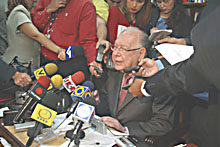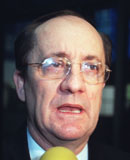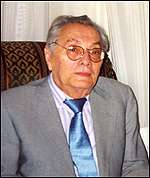You think this was too confusing before?
The recall saga just got 40% more confusing thanks to the Supreme Tribunal Electoral Chamber’s just announced “preliminary injunction” temporarily resuscitating the 876,000 questioned signatures, por ahora.
The preliminary ruling is the start of what promises to be an intricate courtroom battle inside the Supreme Tribunal…just like a Grisham courtroom battle, with the exception that at least 9 of the 20 magistrates on the court are openly on the side of the government.
Who’s who in the Supreme Tribunal?
The first thing to understand is that under the 1999 Constitution (i.e. CHAVEZ’S constitution) the Supreme Tribunal is composed of four chambers, salas in Spanish. Two of them are relevant here: the Sala Electoral and the the Sala Constitucional. The Sala Electoral has been siding with the opposition, the Sala Constitucional is on Chavez’s side.

Sala Electoral head (and new opposition hero) Alberto Martini Urdaneta
The Sala Constitucional is first among equals on the court. At the same time, the salas are also supposed to be autonomous from one another. According to precedents set in the Sala Constitucional’s own jurisprudence, each sala is supposed to have exclusive jurisdiction over its constitutionally delimited area of endeavour. It would seem straightforward to assume that the whole purpose of having an electoral chamber would be to decide on electoral cases like the one now in front of the court.
But, of course, it’s not so simple: too much is at stake.

Sala Constitucional head and Supreme Tribunal chairman: Iván Rincón, chavista duro.
The current Tribunal was selected after the 2000 elections, when chavismo had a 109-56 majority in congress, but not the required 110-55 (2/3rds of the chamber) needed to select all the magistrates all on its own.
Back then, the government was not as sectarian as it is now, and Chavez allowed his then number 2 man to cut an old-regime, old-style, fourth republic deal with a part of the congressional minority to get the needed majority. The government would keep 14 magistrates on its side – proportional to its majority – and the opposition would get six. Within the opposition, only AD and Proyecto Venezuela participated: AD got four magistrates, the smaller Proyecto Venezuela got two.
The AD-PV-Government carve-up outraged the rest of the opposition at the time but, with the benefit of hindsight, it looks like a smart move.
AD party boss Henry Ramos Allup is not a complete idiot. He knew that base of six opposition magistrates put the opposition within striking distance of the government if only some of the more moderate chavista appointees bolted from an increasingly radical government. In fact, that’s exactly what happened.
The hands of Luis Miquilena
Towards the beginning of the current political crisis, all the way back in December 2001, Chavez’s key political operator, the man who had brought him from the political wilderness into Miraflores, his most trusted lieutenant, the man he chose to run the Constituent Assembly and then sent to the all-important Interior Ministry, number 2, in short, walked away from the government. That’s when Chavez’s trouble started.

Miqui – más sabe el diablo por viejo…
Luis Miquilena was well past 80 even then, and though these days you never see him on TV, his hands are all over the machinations that are deciding Venezuela’s future. Miquilena has been a left-wing political operator for literally seven decades, yet he remains sprightly and clear headed, if a bit curmodgeonly. He was a relative moderate in the early, moderate phase of Chavismo, and he placed key personal loyalists throughout the state aparatus on behalf of the regime.
So when Miquilena turned his back on Chavez, a number of the justices turned with him, leaving the government with an unstable tie in the full 20-member court. In fact, on sporadic occasions, the court has even ruled against the government by 11-9, exasperating Chavez who called their decision at the time “a turd.” That precedent is surely worrying Miraflores now.
Now that, as oft predicted, the entire National Crisis has come crashing onto the Supreme Tribunal, the exact arithmetic of Miquilena’s friendships becomes critically important. There are surely waverers, even if most counts suggest a 10-10 split.
Miquilena’s shift was also decisive in the National Assembly, where the government’s sizable lead shrunk to a near-tie within months of his decision to leave the fold. Since, the government has attempted to use the Natonal Assembly to pack the court illegally with 12 new hardline pro-Chavez judges. But the opposition thankfully had sufficient numbers in the National Assembly to fillibuster the attempts, again drawing furious ire from the government and the chavista assembly leadership. Again, the hands of Luis Miquilena were crucial in allowing the opposition to resist as long as it has.
Today, we see that the opposition has been right not to abandon the state’s institutions, even as chavismo works to destroy them. Its fight in the Assembly prevented a total takeover of the court before this critical moment. Its “unpalatable choices” of 2000 mean it has at least some sympathizers in the courts.
This should not be taken to mean that Chavez has basically played fair, allowing these institutional spaces to be occupied by opponents willingly. To the contrary, the government has a long and dark record of subverting constitutional principles in issuing more or less direct orders to nominally independent institutions. It also has a long habit of attempting to re-write the rules of the game in its favor, arbitrarily, whenever it fails to railroad the opposition altogether. The episode of the “assisted” signatures needs to be kept in this context, in the context of a government that has re-written the Assembly’s rules of procedure eight times in three years, each time to take procedural spaces away from the minority in the chamber, who represent the majority in the country. Now, the chavista assembly leaders propose a ninth and more radical reform to turn the Assembly into what Chavez has always wanted it to be, a rubber-stamp.
Pissing on the “little blue book”
The reality is that Chavez doesn’t care a damn about the procedures and rules in the constitution. Everyone in Venezuela knows this. The constitution is a stage prop for Chavez, nothing more. Still, its rules constrain him, and more and more he finds that he can’t force people to do what he wants just by issuing an order, like he could in the military.
What follows will not be pretty. And it could take weeks to sort out – weeks the opposition can barely afford with that August 19th deadline looming. The chavistas are clearly in charge of the Sala Constitucional by 3 solid votes to 2. The sala electoral just voted 3-0 in favor of the referendum. The question now is, which sala makes the final decision?
According to Dr. Duque Corredor, who knows more about these things than most, the correct procedure if the Constitutional Chamber tries to poach the case from the Sala Electoral would be for the Sala Electoral to call for a session of the full court to decide which of the two chambers should have jurisdiction. Here the math is far less certain. For sure the chavistas will try to keep the matter away from the full court if they can, it’s just too risky for them – but it is not a foregone conclusion that they would lose in the full chamber: indeed, they might win.
For what it’s worth (i.e. not a lot these days) the constitution is remarkably clear on this one. Article 297 of the “librito azul” doesn’t leave much room for interpretation: “Jurisdiction over contentious electoral affairs shall be exercised by the Electoral Chamber of the Supreme Tribunal of Justice and the other tribunals determined by the law.” If only we had any faith at all that the hardline chavistas in the court would even listen to juridical reasononing at this point…
It’ll be close, though…complicated but close…stay tuned…
Caracas Chronicles is 100% reader-supported.
We’ve been able to hang on for 22 years in one of the craziest media landscapes in the world. We’ve seen different media outlets in Venezuela (and abroad) closing shop, something we’re looking to avoid at all costs. Your collaboration goes a long way in helping us weather the storm.
Donate




